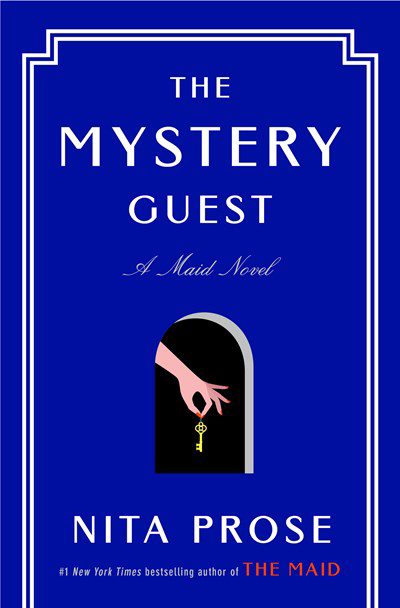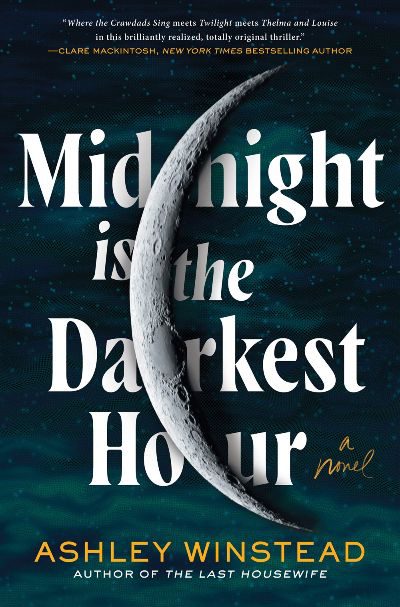This book could just as well be titled When the HOA Attacks or Ring Cameras on Steroids: A How-To. Oleander Court, a street in ritzy Alpharetta, GA, has it all. The fountain with $500 apiece koi, the perfectly maintained lawns (did I mention that HOA?), the perfectly Botoxed neighbors. But a few residents keep things from being too plastic. An artist, Helen Beecham, has moved in and while she likes to observe the others, she’s doesn’t love their snooty book clubs (at which the book is never mentioned) or other tortuous gatherings. A Korean American family, the Jungs, lives on Oleander, too, amid nasty comments; one neighbor in particular spreads the rumor that the mother barely speaks English, only Chinese. Lesbian couple Ray and Laura are hiding their rocky marriage and past secrets. And then there’s Adelaide, who formerly lived in a trailer park but is now married to a doctor and struggling to feel she belongs. Closed circle meets cozy when the nastier neighbors start getting bumped off in their homes, but with little attendant grisliness and dollops of dark humor. Come for the bitchiness, stay for the deep characterization of the oddball characters as well as the puzzling whodunit.
Literary
Millions of fans of Molly—“the maid”—Gray will be delighted with this wonderful second installation, which features returning characters (such as Mr. Preston, the congenial doorman, and Detective Stark, the grouchy cop) along with a handful of new characters. But most important is J.D. Grimthorpe, renowned mystery author, who chooses Molly’s five-star Regency Grand Hotel to make a most important announcement. No sooner does he mount the stage in the perfectly appointed tea room (expect nothing less from Molly, the head maid) than he suddenly drops dead. Very, very dead. And not from a medical condition. J.D. Grimthorpe was murdered. The path to finding the murderer is a long and twisted one, taking Molly back into her childhood and her early days working alongside her beloved Gran. But as guests and employees start looking at each other with accusation in their eyes, the pressure for Molly to solve the case mounts. In the first volume, The Maid, there was much discussion about Molly being autistic or otherwise neurodivergent. Not qualified to make such an assessment myself, I prefer to think of Molly as eccentric. As this tale draws to a close, several secrets are most satisfyingly revealed, and one major opportunity presents itself, which will leave me in a state of wonder until the next Molly mystery. Pronto, please.
Elizabeth is in a rut. Her job isn’t so satisfying, and her marriage is on the rocks. Her every move seems to trigger a report by her husband, David, to their therapist. She feels ganged up on and adrift, which is bad enough. That descends into depression, which others believe is paranoia, when she finds her neighbor Patricia dead. Others say it’s suicide, but Elizabeth is sure it was murder and is determined to find the culprit. She has a willing sidekick in her sleuthing in Brianna, the assistant that David insists his wife take on to help out at home. Brianna, who is Black, is all too willing to be white Elizabeth’s new best friend, Watson to her Sherlock, and de facto therapist, given that Brianna has a strong motivation to insert herself into her employers’ upscale Memphis neighborhood: someone there called the cops on her son and they killed him. As the plot twists and turns, deceptions build, and though readers have the benefit of a birds’ eye view of the story, surprises are in store. This is reminiscent of Elizabeth Day’s Magpie, with its suburban setting and overcrowded marriage; the effects of gentrification and racism also loom large. For fans of Magpie Murders and novels that pack in the psychological drama.
A deep, dark descent into one of Italy’s most disturbing true crimes, drawing on actual documents, news reports, and interviews to tell the story. Billed by the publisher as a “spellbinding literary thriller”—it’s certainly spellbinding, but no one’s definition of a thriller—this is a slow, methodical, layered journey into the murder of 23-year-old Luca Varani. The method? Torture. The perpetrators? Manuel Foffo, who confesses to his father, while driving to a family funeral, that he killed someone—three, four, five days ago?—he’s too drugged out to know. And Marco Prato, also from a “good family,” a nightclub promoter, gay and considering transitioning. Manuel and Marco barely know each other, although after several drug-and-alcohol fueled days holed up in Manuel’s apartment they develop an intimacy that’s somewhat sexual but more a twisted sort of friendship. “So-called psychic contagion, like a racing engine, brought the two young men close to the point of fusion.” What do they share, besides a love of drugs and alcohol? For starters, an inability to mature, jealousy of the rich, and complete irresponsibility. Lagioia intertwines the descent of Manuel and Marco with the descent of Rome itself—drug filled, rat-infested, garbage strewn, home to wild animals, yet ultimately, he claims, freeing. This story begs for comparison with the Nathan Leopold and Richard Loeb murder of Bobby Franks in 1924 Chicago. Brilliantly translated.
Ruth Cornier is that rarity in fiction: a woman who had the chance to get out of the town that’s too small for her—in this case, Bottom Springs, Louisiana—but stayed. Growing up, everyone knew her as the preacher’s daughter, and nothing’s changed, except that she’s no longer under her father’s thumb. She is still, however, the subject of her downtrodden mother’s malice-filled plans to drag her back to the snake-handling church’s fold. What’s so objectionable about Ruth? It’s her firm friendship with Everett Duncan, her Heathcliff-reminiscent best friend, who’s returned to town after Ruth thought him gone for good. While Ever is the kind-hearted son of the mean town drunk, locals think he’s an apple from a no-good tree, and even suspect him of being the Low Man, a supernatural being who drags people into the swamp. When a skull is found in that same swamp, Ruth and Ever are thrown back into dark days of their youth while also desperately trying to find what really happened before Ever gets what locals think he deserves. As in Winstead’s In My Dreams I Hold a Knife, sharp writing, compelling dual timelines, and sympathetic characters will keep readers turning the pages.
Pulitzer Prize-winner Whitehead’s second Ray Carney book begins in the 1970s, when Ray’s Harlem furniture shop is firmly established. But, given the chaos that it engendered in Harlem Shuffle, his stolen-goods—sorry, “previously owned merchandise”—sideline is no longer. Readers of the previous book will find the setup turned inside out: instead of conquering Harlem, Ray has been ground down by it. He now sits precariously atop his small empire, the relentless engine that is the city seeming to churn the ground beneath his feet. Also different: this time Ray endures the relentlessness of several decades of upheaval compared to the relatively short and, in retrospect, gentle, time when he was a striving young man in the ‘60s. The neighborhood doesn’t want to let him retire his fenced-goods work and the Black Panthers and Black Liberation Army are competing for dominance, a fight Ray wants to sidestep. A crackdown on police corruption sees him dragged into worse and worse actions as his former associates get desperate. Ray’s troubles and determination mirror the fighting spirit of his neighborhood; his saga is New York City’s, with the shocking and sad tale displaying moments of hilarity alongside heartbreaking lows. Whitehead’s writing is fantastically evocative as usual, and his rebuilding of recent decades of New York City life, and of the unforgettable Ray Carney, is a treat to read.
You could call it a meta-mystery. Or you could just call it a whole lot of fun. Gerald Ford is president, the Concorde is dominating the news, while Neil Sedaka is on the turntable. Detective Adam McAnnis accompanies a college chum to the West Heart Club, sort of an Adirondack hunting club set in the northern New York wilderness, crawling with tipsy uber-WASPS. This place is so old and insular the residents speak their own sort of slangy English. What brings a New York City detective to this rarefied compound? Hard to say, but it’s clear he’s got a motive. Comparisons to the Blades Out series are inevitable, but McDorman’s novel is a whole lot more sophisticated and a good deal more humorous. Reading this book is a bit like driving behind a school bus and a garbage truck; the narrative leaps ahead, only to pause while we’re treated to an essay on the rules of the mystery, or the nature of locked-room stories. Then we move ahead a bit, only to stop and be regaled by the disappearance of Agatha Christie, Auden on the Whodunit, and any number of references to mystery’s grand tradition. Confused at where we are? Fear not. There are narrators ready to jump into the fray and remind us we are in a detective story, and what to believe—and what not. It’s a thrill to come across a book that is at once so playful and so erudite.
Small towns in cozies tend to center on sumptuous bakeries, homey libraries, and kind neighbors. Walsh and his characters aren’t here for that. Instead, they kick you upright to witness the rot that can set in when greed, fear, and both too much and too little hope clash in a small community. The story here focuses on the titular character, a member of a Kinlough, Ireland posse of teens who make fast, cutting judgements—some startlingly accurate—about those around them. Those judgements and their attendant goings-on follow the group over decades. Except for Kala, that is, because she goes missing as a teen, an event that’s explored through flashbacks to that hormone-and-sunshine-filled time and in the present, when one of the gang returns to Kinlough for a wedding and Kala’s disappearance becomes a focal point once more. This is far more Stuart Neville than Maeve Binchy, and includes both graphic descriptions of animal abuse and child abuse that happen off the page, but if you can stomach those scenes, you’re in for a memorable tale with not a word wasted. Side note: until I checked, I thought this was written by an Irish woman, as my days as an all-girls’-school-schoolgirl in rural Ireland were that faithfully reproduced (hand me the smelling salts whenever you get a chance).
Parisians Ludovic and Louise, each thirty-something, are enormous outdoor enthusiasts. Louise in particular is an avid mountain climber, and her passion for nature is part of what draws Ludovic to her. Ludovic is more the risk-taker and he convinces Louise to take a sabbatical, before they marry and have children, and sail around the world. After months of planning, they head off in their sailboat to the Cape of Good Hope. In the Antarctic Ocean, they make a stop at a deserted island. In fact, visitors aren’t allowed there at all, which makes their clandestine visit all the more exciting. But then, by immense misfortune, they become stranded on the island, a place never officially on their itinerary and that no one knows they planned to visit. Suddenly, everything changes, and they are forced to rely on each other in completely new ways while maintaining hope they’ll be rescued. Autissier is the first woman to have sailed around the world solo in competition, and her experience informs the narrative brilliantly. The suspense is rooted in her knowledge of nature, from the fierce storms that roll over the island to the lives of the penguins and seals that provide the couple with sustenance. Prepare to be thinking about this book for a long time. It’s that suspenseful, that emotionally engaging, that beautifully written and translated.
I’ll be 51 this Sunday and I read two books a week. It adds up, and this is the best I’ve ever read. As it’s very far from an ordinary read , I can’t write a review as I normally would. The plot and characters are fantastic, compelling, memorable, surprising…but the book is more than anything a magic box. Trussoni also has an unsettling ability to mention everything of interest and everything that has come up lately. I thought about making a website that would emulate the ability of a pile of transparency sheets to create a composite image, and that process is mentioned. I learned about the idea of the singularity this week–the possible future time when technological growth becomes uncontrollable–and it’s there. A central theme is a kind of mythical creature I had mentioned to me recently. And the characters, and of course the author, see into the reader in other ways, with the bizarre turns in the tale perfectly allowing every nuance of the strange folks within to emerge, but also startling the consumer of this sorcery on every page. What’s the book about? Everything, but there’s a framework. A puzzle maker, who, through a brain injury, gains the remarkable ability to see “that particular kind of order that [distinguishes] a puzzle from everything else on the planet,” meets a prisoner who hands him a drawing, a puzzle he can’t even begin to unlock. It leads him to letters and a diary that describe a dangerous quest to “lift the veil between the human and the Divine and [stare] directly into the eyes of God.” There’s homework before you read this so that you can be in the right frame of mind to take in its wonder. Read Brian Selznick’s The Invention of Hugo Cabret, Shaun Tan’s The Arrival, Stephen King’s Pet Sematary, Aimee Pokwatka’s Self Portrait with Nothing, and Ray Kurzweil’s The Singularity is Near. And then clear a weekend.










